Soil pH is very important for optimum plant growth. The term pH is a measure of how acidic or alkaline a substance is, in this case, the soil. It ranges from 1.0-14.0, with 7.0 being called neutral.
The lower the number the higher the acidity. The higher the number the more alkaline, or less acidic, the soil is.
The acidity or alkalinity of the soil influences how easily plants take up nutrients. Too much acidity and the nutrients in the soil dissolve slowly or not at all. The ideal pH of soil is 6.5-7.0.
Fertilizing the soil is of little use because it cannot be utilized by the plant. High alkaline soils can indicate high levels of sodium that can negatively affect plant growth.
Soil pH testing can be easily accomplished. The items needed for this task are commonly found in almost everyone’s home.
Materials needed:
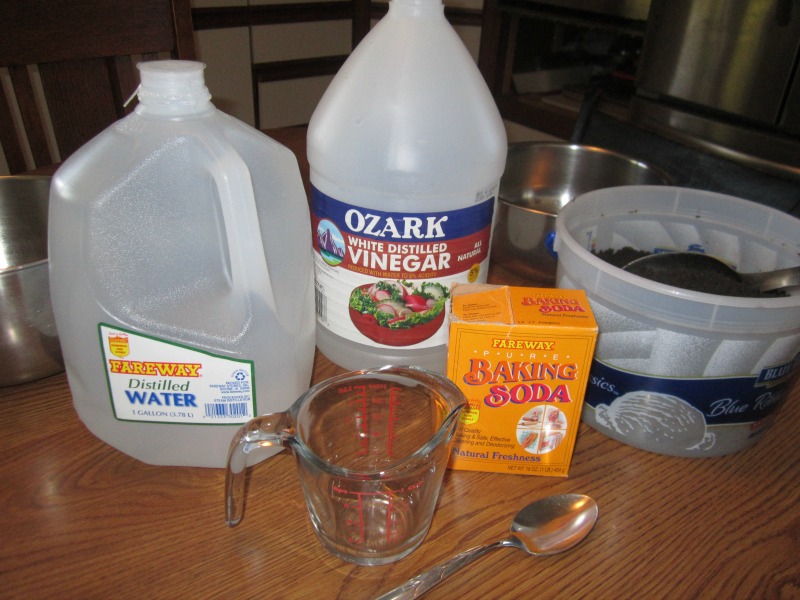 garden spade or shovel
garden spade or shovel
bucket to mix soil
2 containers
measuring cup
tablespoon
white vinegar
distilled water
baking soda
pH test strips, also known as litmus paper, optional
Step 1: Collecting Soil Samples
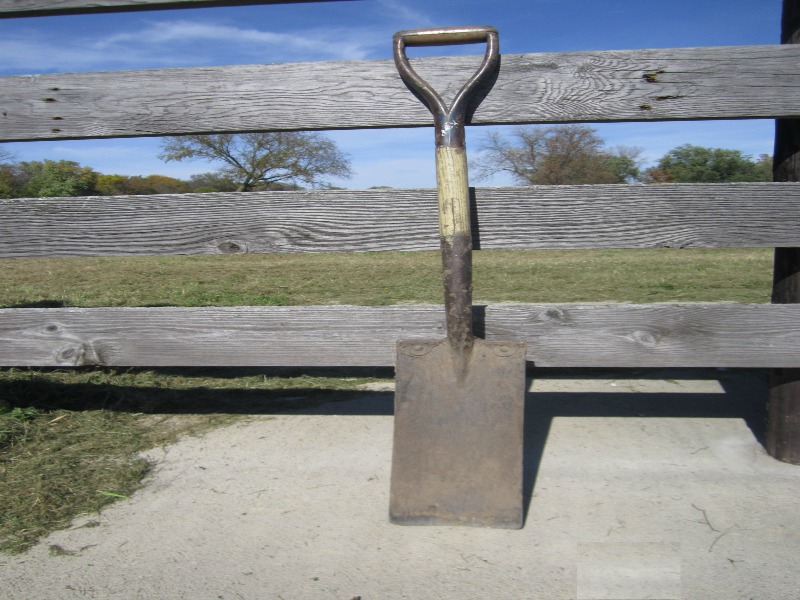 A flat spade works great for collecting your soil samples. To obtain a good sample, dig down at least 6-8 inches and make a hole.
A flat spade works great for collecting your soil samples. To obtain a good sample, dig down at least 6-8 inches and make a hole.
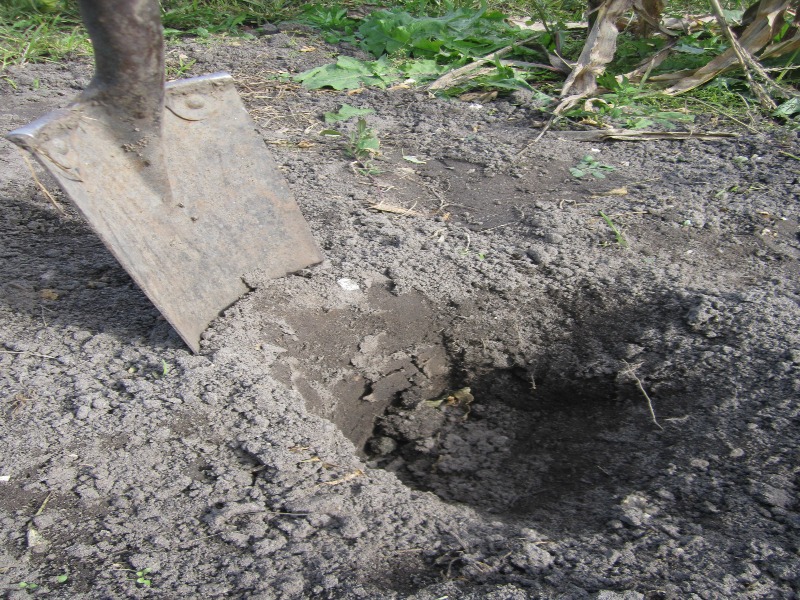 Position the spade 2 inches back from the opening and go down the depth of the hole. Take about a ½ cup soil from the length of the spade. This is the soil that you will use for your sample.
Position the spade 2 inches back from the opening and go down the depth of the hole. Take about a ½ cup soil from the length of the spade. This is the soil that you will use for your sample.
Put the sample into the bucket you will be using. Do this in several different areas of your garden and then mix the samples together well.
Scooping soil from only the top layer will not give you an accurate result. You need to get soil from where the roots of your plants will be taking in nutrients. If you prefer, each location can be tested separately.
Step 3: Testing the Soil
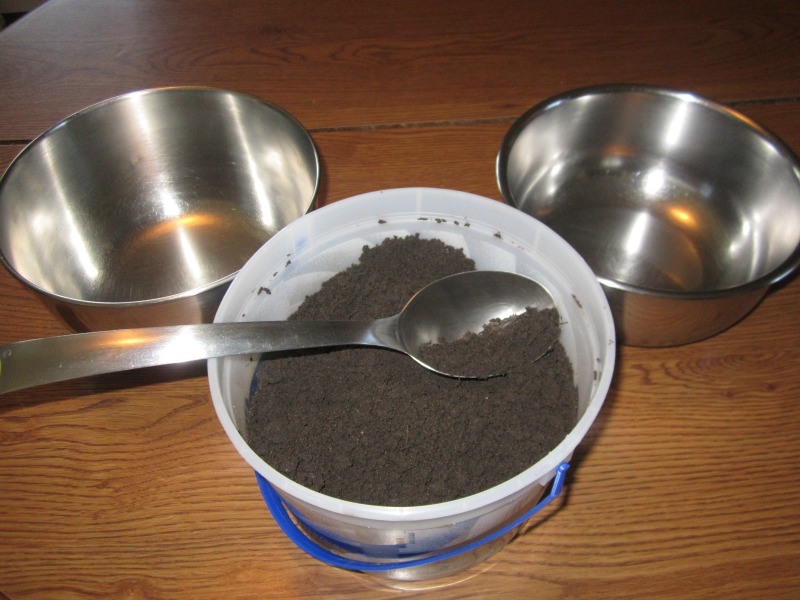 Put two tablespoons of soil into separate containers.
Put two tablespoons of soil into separate containers.
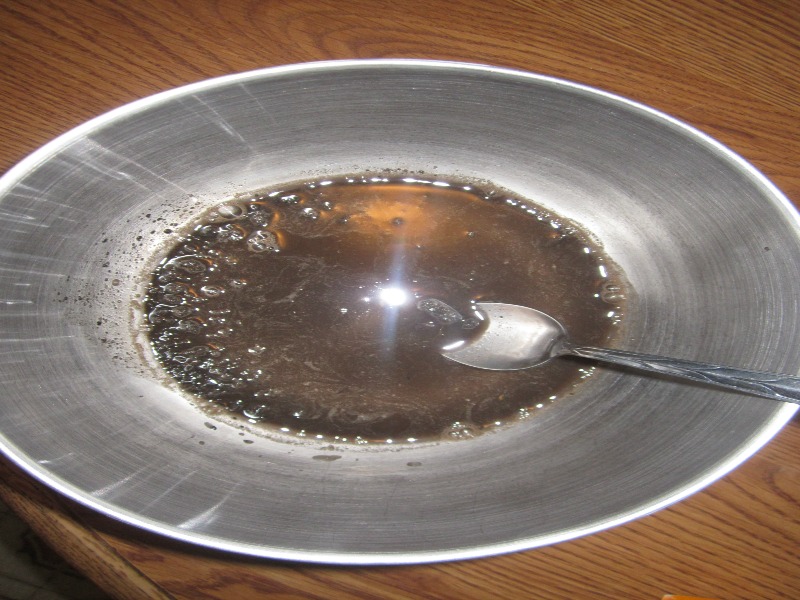 Add ½ cup vinegar to one of the containers.
Add ½ cup vinegar to one of the containers.
If the mixture fizzes this means that you have alkaline soil with a pH higher than 7.0.
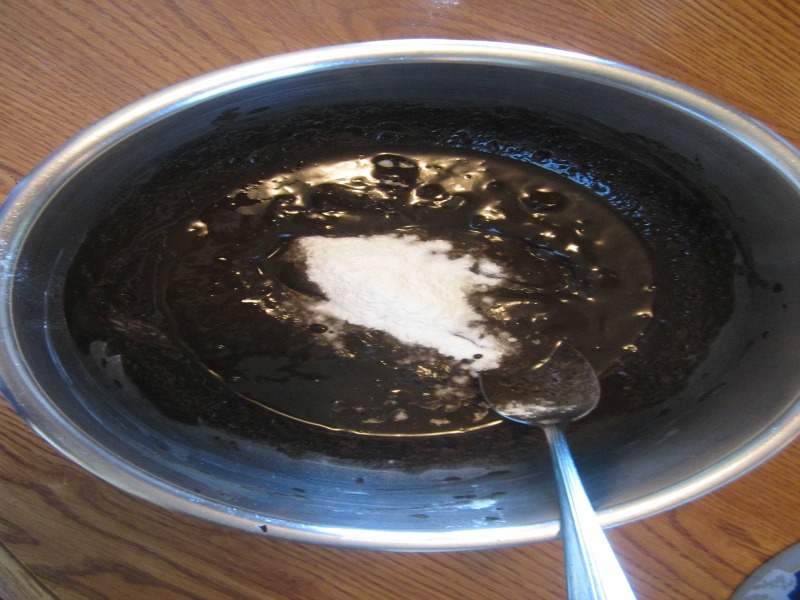 If the mixture does not fizz, then add distilled water into the 2nd container of soil until it is muddy.
If the mixture does not fizz, then add distilled water into the 2nd container of soil until it is muddy.
Sprinkle baking soda on the mud and watch for a fizz reaction.
A fizzing reaction means you have acidic soil with a pH below 7. If there is no reaction then you have soil that is neutral, the preferred range for most plants.
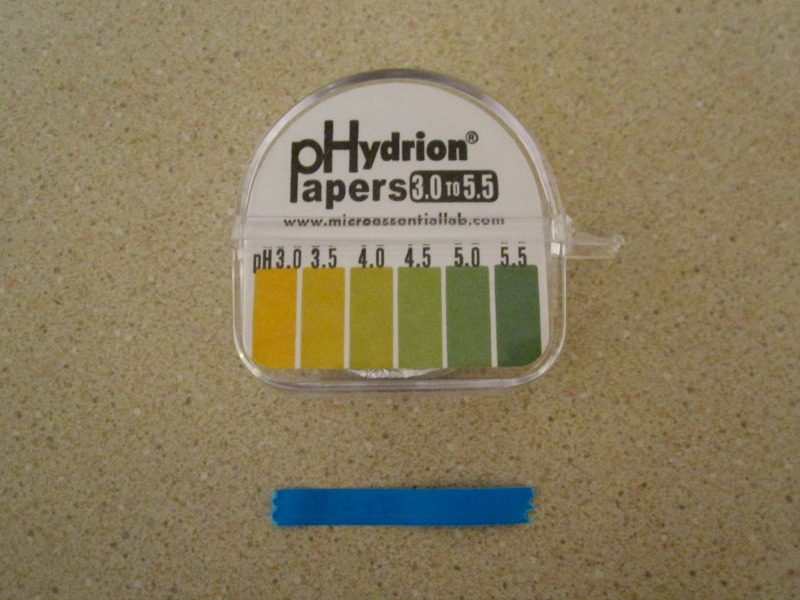 To get an actual pH measurement of the soil you can get pH test strips, also known as litmus paper, with the full range of readings, 1.0-14.0. Mix some of your soil with distilled water until it is the consistency of a milkshake.
To get an actual pH measurement of the soil you can get pH test strips, also known as litmus paper, with the full range of readings, 1.0-14.0. Mix some of your soil with distilled water until it is the consistency of a milkshake.
Put a strip in the mixture for about 20-30 seconds, then dip in distilled water to clean off the mud. Now compare the color of the strip with the color codes furnished with the test strips.
Bonus Information
You can amend the pH of your acidic soil by adding ground agricultural limestone in the fall. It takes about 6 months for the lime to change the pH of the soil. The limestone can replace calcium and magnesium that rain has leached out of your soil. To correct high alkaline soil apply well-decomposed organic matter, such as compost. You may also add gypsum or powdered sulfur to your soil to bring down the alkalinity.
And for all the donkeys running our country just remember our country runs better than yours with all those donkeys.
??????
I don’t know why everyone is so offended this is literally an ineffective way to test and i only did test strips in highschool chem we did much more in college so this is about a very very elementary chemistry test because yes that is exactly what you are doing. Use glass or plastic, i dont know where in the hell you hear plastic isn’t safe for food. If I looked in your fridge 90% of everything in there come in plastic you dingus. Using a plastic spoon isn’t harming anything get your head out of your bad google phd’s and take the help people offer. Shoot, just pass the slurry of distilled water and dirt thru a coffee filter using plastic spoons and glass bowls. None of this requores a degree in anything just passing one semester of chemistry in highschool. Slow down people
Also I got 4-320 packs of strips on amazon. 3$ Just look up litmus paper cause ph strips bring up all that farcical keto I’m not getting into here.
This is wonderful information for those of us who aren’t eager to spend masses of money we don’t need to. Some people tell soil acidity by tasting it, that’s a bit extreme for me!. I have every confidence in this but for fun.. I just bought some strips a couple of weeks ago, waiting for the soil to thaw. I’m going to try both and see what happens. I certainly am expecting roughly the same result.
So many people on the interweb who have nothing better to do than try to pull down people who are contributing! Thank you so much for all the information you share, you do a great job!
and… I’m not an American so can’t vote but your donkeys would surely do a better job that at least one of the current candidates for President!
Thanks Pam and the donkeys do appreciate you support even if you can’t vote.
This article was meant to be a simple and inexpensive way for amateur gardeners to get an idea of the pH of their soil. I realize there are other, more technical choices available. We are talking flower gardens and vegetable gardens for home use and enjoyment, not a chemistry experiment.
Literally is a chemistry experiment that 15 year olds do in school. Coffee filter are cheap as litmus paper. Get dostilled water pass the mix throught the filter after it settles from beating it. Test the liquid you squeeze out. Boom easy
As someone who used to do this for a living, and has degrees in chemistry, I can say with authority that this method does not work, it will never work, and it will lead you to harm your soil.
True distilled water is pH of 7.0 with absolutely nothing in it; and you, as an individual can’t purchase it legally. It’s a regulated substance.
Distilled water in the stores is nothing more than filtered water with a pH that can range from 6.5 to 8.5. Vinegar can range from widely from 2.0 to 6.0. Plus, those little pH strips are widely inaccurate.
This article was submitted by a reader. We would love for you to submit an article using your technique.
Maybe somebody needs to be paid to check these articles before posting them.
http://mikesbackyardnursery.com/get-paid-to-share-your-expertise/
Chris, I am an analytical chemist with over 22 years of experience. My specialty is water chemistry.
Please show me the regulations that prevent me from owning distilled water, or as you call it, “Water with absolutely nothing in it.”
Does this same fantasy law cover water from a reverse osmosis system? Like the ones millions of people have in their kitchens? If pure water is banned, then certainly R.O. water would be banned too.
Because R.O. water is more pure than any distilled water. Distilled water has trace minerals (ions) in it. R.O. water has fewer ions. This can easily be confirmed by simply measuring the conductivity of each solution.
The conductivity of R.O. water will be less than distilled water due to the presence of fewer ions.
We will all stand by awaiting your posting of the law banning distilled water.
PS
If you want really pure water you can run it through some ion exchange resin after your R.O. system. Ion exchange cartridges that fit common household filter housings can be purchased on line or at an aquarium shop. I use them to remove chloroamines from my water prior to making wine! Chloroamines are used nowadays to purify municipal water instead of chlorine.
None of this is illegal, by the way. And any water produced coming from a system like this would be far more pure than any distilled water.
Distilled has been evaporated and condensed. RO is not as pure, trust the chemist! Also, those metal bowls are not neutral. And the best pH is not 6.5 to 7 for all planets everywhere. Blueberries, Azaleas, Miracle Fruit all need a much lower pH. At least most of the comments are good.
Distilled and deionized water can have a pH below 7.0 and as low as like 5.6 due to CO2 absorbed from the air which turns into carbonic acid. You need to adjust the reading based on the pH of the water.
I know of doctors who have degrees as well…and guess what…they BURY their mistakes!!!
No distilled water is not just ran through a filter it is ran through the distillery process. Where a liquid is grafuly heated and its vapours are carefully captured at specific tempetures, isolation a molecule that has that temp as its boiling point As for if it is a regulated substance, i could not put it past the bureaucracy to attempt to limit access to water that could possibly become super heated if microwaved.
See i know that the distilled water is more than just filtered because no filter could remove all metel and salts to make it pure enough to have said water superheated and then have a violent explosion when spoon is introduced. It does, I just confirmed it to be sure before I decided you were out of touch or I may have had a nontypical experience in buying distilled water that was in order with the Truth in Labelling Laws
You are wrong. I have le blue water and it’s ph is 5.0.
Horribly flawed pictures and descriptions. Metal shovels, bowls, and spoons should not be used. Using them can give false results, Use plastic tools, including a plastic spade or trowel.
http://mikesbackyardnursery.com/get-paid-to-share-your-expertise/
In our experience with farming (25 years), the soil samples taken for analysis were taken using stainless steel probes.
Agreed. Only stainless steel here and plastics are strongly discouraged around food and plants. I use your method and I rely on it. It has never failed me. The brainiacs in the other posts are missing out on great information. Keep up the great work with the articles. We true gardeners are listening.
Thanks Robin, we do appreciate that.
Lol braniacs…just people who retained elementary chemistry knowledge. Who told you a plastic spoon was harmful to food? Theres a braniac